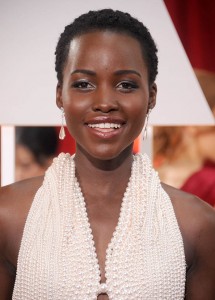(Akiit.com) The arts present opportunities for us to be deeply uncomfortable and yet totally safe. And for me they have become a space for radical transformation. Most recently I was reminded of this during Lupita Nyongo’s performance in Eclipsed, a story of the women of the Liberian civil war, at the Public Theater. The moment she stepped on stage I felt an incredibly familiar dread. Her hair — unkempt and knotty — splayed around the top of her face like a crown of a displaced queen. Her clothes, dirt-caked, torn rags, dingy and barely covering a pair of bony knees. My heart ached and my breathing became shallow and she spoke to a pair of women, one young and pregnant, the other solid and braiding her hair inside a structure that could barely be called a building. I wanted to get out of my seat and leave the room. I wondered how could they have agreed to be in this place, to be so wrong in front of an audience. Especially this audience.
When I was in the lobby I played my favorite game, “count the black people,” and came up with a number that fit on two hands. This was a primarily white audience and the thought that they, too, could were watching these women in such a state felt like too much. When black bodies are on display like this I experience a genuine fear that these white people will forget that this is a story and it will reinforce their thoughts that we are only worthy of their pity and compassion, rather than equality.
But what does it say about me, that my immediate reaction to these characters was a desire to cover them up, to present them as clean, more refined and genteel?
I have been a “safe” black person for my whole life. You know, the  black person that white parents meet and think, “Oh what a nice, articulate black woman.” They assume that I received some scholarship to go to a nice boarding school, got into some liberal arts school with the help of affirmative action and will never be a danger because I’m “well behaved.” That’s not my story – but for my entire life, I’ve derived pride from being a “good black” person. I am the kind of black person who goes to events at the Harvard Club, has a weekend place and is an arts patron. Some people would call me bougie. I would call them right. But even the bougie yearn for liberation.
black person that white parents meet and think, “Oh what a nice, articulate black woman.” They assume that I received some scholarship to go to a nice boarding school, got into some liberal arts school with the help of affirmative action and will never be a danger because I’m “well behaved.” That’s not my story – but for my entire life, I’ve derived pride from being a “good black” person. I am the kind of black person who goes to events at the Harvard Club, has a weekend place and is an arts patron. Some people would call me bougie. I would call them right. But even the bougie yearn for liberation.
Unfortunately, we are choking on respectability politics. We are bound and struggling and need a path out. More now than ever we need to be brave, honest, real and ready. Because our lives and the lives of those that we love are constantly threatened. And we must use our comfort to secure and advocate for those who are not in the same circumstances. Because we can afford to.
Over the past few years, in light of the video evidence of police brutality, there has been increased coverage in popular and niche media of respectability politics. And I have been grateful for this but also have felt dismayed, for they offer no solutions. No ways out. Just a terrifying reminder that my fanciness won’t save me. And more importantly that my pretense alienates me, makes me uncomfortable in the hood, unsure of what to do when I’m in all-black spaces.
Well, it did, until I found a door to the community and the movement – an entry to sisterhood. I remember when I saw Carrie Mae Weems retrospective at the Guggenheim, there was a single photograph, titled May Flowers and produced in 2002, that made me weep. Standing in the white rotunda, I cried because I had never seen little black girls as art. And we were beautiful. It was one of the most moving experiences of my life and opened me up to realizing how committed I am to the lives of black girls. How much I yearn for them to have comfort, security and, more importantly, justice.
I remember the first time that I saw the brilliance of Jawole Willa Jo Zollar’s “Urban Bush Women,” a dance company that tells the stories of women of the African Diaspora through movement. The dancers’ bodies were so strong and present. It made me so uncomfortable and yet I was fixated in finally seeing a figure like mine and with such power and comfort. I envied their freedom and was inspired to reclaim my own physicality.
The arts have given me space to heal and Eclipsed gave me space to hope that by being in community, we can create new realities. Even when times are tough. So this is a thank you to Lupita and playwright Danai Gurira for their revolutionary courage.
Columnist; Simone N. Sneed
Official website; http://www.twitter.com/uptownupstate









Leave a Reply